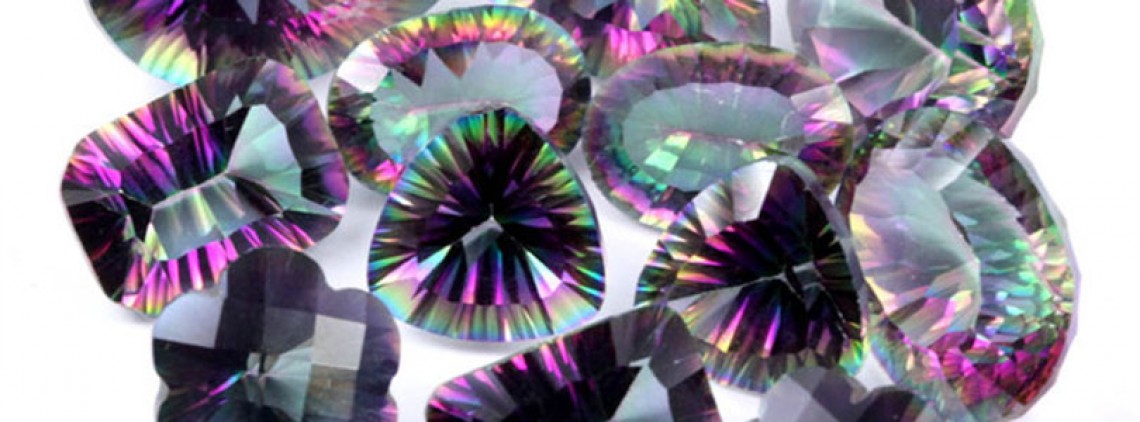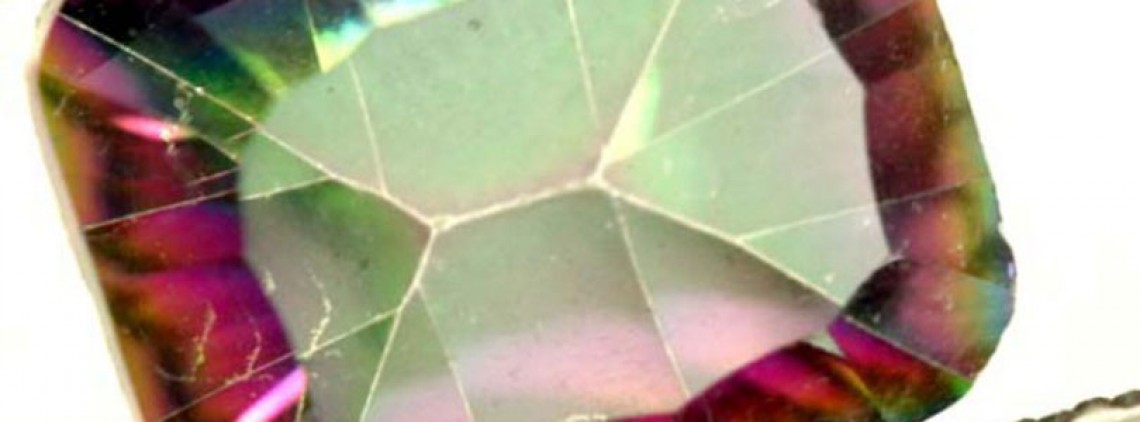
Published at 8th May 2018
Modified at 2nd Aug 2023
Azotic Treatment Of Quartz And Topaz

Generally Azotic treatment refers to a process of coating a colorless gemstone such as Topaz or Quartz with different chemicals to create an array of different colors. In the market today there are two distinct types of treatments. There is the trademarked process known as Azotic coating and then there is the more general ‘surface coating’ of gemstones. The most common term you will find is “Mystic Topaz” which is the most popular type of Azotic Topaz.
Some sellers are listings gemstones with a mystic color as Azotic, This is a copyright gemstone technique and if your are not buying from a Azotic vendor or reseller then the gems you are buying are not Azotic.
SURFACE COATING OF GEMSTONE
There are multiple ways to coat gemstones using different chemicals. Some of the colors available are very vibrant such as the ‘Salmon Sorbet’ shown below.

Since Topaz is such hard gemstone (measures 8 on the MOHS scale) and it is inert to almost every chemical it is a very easy gemstone to coat without having any adverse chemical reactions.
AZOTIC TREATMENT OF GEMSTONES
All Azotic® enhancements are created utilising a process that DOES NOT use radiation or harsh chemicals.
The quality of the gemstone clarity, the faceting brilliance, and the polishing shine are equally important as the enhancement process. The distributor provides Azotic Coating with the substrate material (topaz, quartz, or CZ) for enhancement. The enhancement process is dependent on the selection of quality substrate materials.
Another small but pertinent fact is that The Patented processes manufactured by Azotic can enhance all cuts and sizes up to 30mm for approximately half the cost while maintaining less than half the breakage rate. Sizes are not created above 30mm.

Azotic Coating Technology offers a wide range of sputtered metallic, oxide and nitride films. Reactive sputtering of metal oxides, carbides and nitrides is our specialty. The films produced by reactive sputtering are hard and dense and generally exhibit excellent adhesion. Substrate temperatures are low, usually below 80 degrees C. Almost anything solid and vacuum compatible (nonporous) can be coated. Itemscoated include: glass, quartz, topaz, sapphire, diamond, silicon, ceramics, metals, plastics, crystals, biocompatible materials and even insects.
HOW TO CARE FOR AZOTIC TREATED GEMSTONE
As like all treated gemstones we recommend just using warm water with dish washing liquid and a gentle cloth. If you use an ultrasonic cleaner we also recommended dish washing liquid and no abrasive materials. The treated layer is microscopic thin and does last if no abrasive materials rubs against it. However the gem can become dull if the coating is rubbed off in certain parts. The image below shows where the coating has been removed along the ridges where the facts meet.

Also direct sunlight is not recommend for long periods. Even mystic quartz which is a natural quartz treated gemstone should be cleaned in the same process.
SHOP FOR MYSTIC AND AZOTIC GEMSTONES
Search the Gemstone Encyclopedia
Related Auctions
Related Articles
There are dozens of quartz and chalcedony gems with various colors and patterns. Learn all about quartz properties and every type of quartz, from amethyst and agate to plasma and phantom quartz!
15th Oct 2020
Quartz and Topaz are two of the most common minerals on the planet. They also look very similar. Let's look at some properties of them and compare Quartz and Topaz.
23rd Oct 2018
Gemstones and crystals are capable of absorbing and conveying energy, that’s why it’s important to cleanse, re-charge and program your stones so that they may achieve their best potential.
9th May 2018
Latest Articles
Yugawaralite is a rare colorless, white, or pinkish zeolite crystal named for its discovery in Yugawara, Japan. Here we uncover the multifaceted history, properties, prices, and uses of yugawaralite.
24th Mar 2025
Simpsonite is a lesser-known mineral known on the gem market for its durability, yellow-orange color, and rarity. Discover all the properties, uses, prices, and history of simpsonite.
3rd Mar 2025
Kurnakovite is a colorless crystal related to inderite and rarely faceted but known among collectors. Explore the mineral traits, history, prices, and more in this kurnakovite guide.
17th Feb 2025
Article Categories
How To's is where you will find helpful articles from gem Rock Auctions on how to cut gemstones, select gemstones and buy gemstones.
9 Articles






